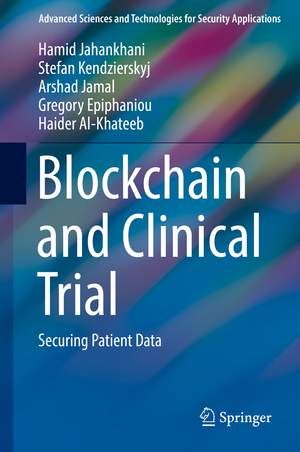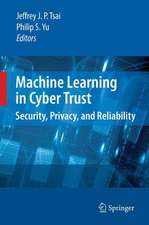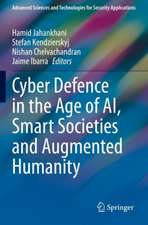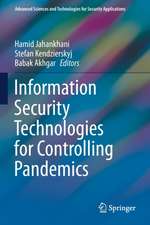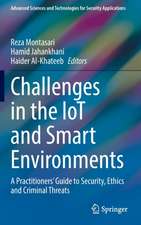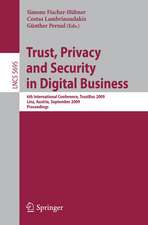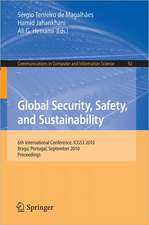Blockchain and Clinical Trial: Securing Patient Data: Advanced Sciences and Technologies for Security Applications
Editat de Hamid Jahankhani, Stefan Kendzierskyj, Arshad Jamal, Gregory Epiphaniou, Haider Al-Khateeben Limba Engleză Hardback – 18 apr 2019
Lack of data transparency is an underlying theme within the clinical research world and causes issues of corruption, fraud, errors and a problem of reproducibility. Blockchain can prove to be a method to ensure a much more joined up and integrated approach to data sharing and improving patient outcomes. Surveys undertaken by creditable organisations in the healthcare industry are analysed in this book that show strong support for using blockchain technology regarding strengthening data security, interoperability and a range of beneficial use cases where mostly all respondents of the surveys believe blockchain will be important for the future of the healthcare industry.
Another aspect considered in the book is the coming surge of healthcare wearables using Internet of Things (IoT) and the prediction that the current capacity of centralised networks will not cope with the demands of data storage. The benefits are great for clinical research, but will add more pressure to the transparency of clinical trials and how this is managed unless a secure mechanism like, blockchain is used.
Din seria Advanced Sciences and Technologies for Security Applications
- 18%
 Preț: 903.93 lei
Preț: 903.93 lei - 18%
 Preț: 738.20 lei
Preț: 738.20 lei - 18%
 Preț: 969.61 lei
Preț: 969.61 lei - 18%
 Preț: 791.88 lei
Preț: 791.88 lei - 20%
 Preț: 994.92 lei
Preț: 994.92 lei - 15%
 Preț: 643.65 lei
Preț: 643.65 lei - 5%
 Preț: 672.99 lei
Preț: 672.99 lei - 15%
 Preț: 649.22 lei
Preț: 649.22 lei - 20%
 Preț: 1051.84 lei
Preț: 1051.84 lei - 15%
 Preț: 704.36 lei
Preț: 704.36 lei - 17%
 Preț: 491.11 lei
Preț: 491.11 lei - 20%
 Preț: 1162.37 lei
Preț: 1162.37 lei - 15%
 Preț: 644.95 lei
Preț: 644.95 lei - 20%
 Preț: 934.69 lei
Preț: 934.69 lei - 20%
 Preț: 1273.74 lei
Preț: 1273.74 lei - 20%
 Preț: 991.60 lei
Preț: 991.60 lei - 20%
 Preț: 889.12 lei
Preț: 889.12 lei - 15%
 Preț: 704.36 lei
Preț: 704.36 lei - 9%
 Preț: 732.28 lei
Preț: 732.28 lei - 18%
 Preț: 783.98 lei
Preț: 783.98 lei - 18%
 Preț: 1223.88 lei
Preț: 1223.88 lei - 20%
 Preț: 480.05 lei
Preț: 480.05 lei - 15%
 Preț: 648.42 lei
Preț: 648.42 lei - 18%
 Preț: 1224.36 lei
Preț: 1224.36 lei -
 Preț: 381.43 lei
Preț: 381.43 lei - 20%
 Preț: 1068.44 lei
Preț: 1068.44 lei - 18%
 Preț: 734.59 lei
Preț: 734.59 lei - 15%
 Preț: 586.38 lei
Preț: 586.38 lei - 20%
 Preț: 937.81 lei
Preț: 937.81 lei - 18%
 Preț: 1120.18 lei
Preț: 1120.18 lei - 24%
 Preț: 590.42 lei
Preț: 590.42 lei - 18%
 Preț: 1007.17 lei
Preț: 1007.17 lei - 24%
 Preț: 815.83 lei
Preț: 815.83 lei - 24%
 Preț: 747.51 lei
Preț: 747.51 lei - 20%
 Preț: 937.81 lei
Preț: 937.81 lei - 18%
 Preț: 721.30 lei
Preț: 721.30 lei - 15%
 Preț: 646.75 lei
Preț: 646.75 lei - 15%
 Preț: 698.62 lei
Preț: 698.62 lei - 18%
 Preț: 794.07 lei
Preț: 794.07 lei - 18%
 Preț: 738.06 lei
Preț: 738.06 lei -
 Preț: 388.13 lei
Preț: 388.13 lei
Preț: 936.37 lei
Preț vechi: 1170.46 lei
-20% Nou
Puncte Express: 1405
Preț estimativ în valută:
179.20€ • 186.39$ • 147.94£
179.20€ • 186.39$ • 147.94£
Carte disponibilă
Livrare economică 24 martie-07 aprilie
Preluare comenzi: 021 569.72.76
Specificații
ISBN-13: 9783030112882
ISBN-10: 3030112888
Pagini: 275
Ilustrații: VIII, 267 p. 84 illus., 73 illus. in color.
Dimensiuni: 155 x 235 mm
Greutate: 0.59 kg
Ediția:1st ed. 2019
Editura: Springer International Publishing
Colecția Springer
Seria Advanced Sciences and Technologies for Security Applications
Locul publicării:Cham, Switzerland
ISBN-10: 3030112888
Pagini: 275
Ilustrații: VIII, 267 p. 84 illus., 73 illus. in color.
Dimensiuni: 155 x 235 mm
Greutate: 0.59 kg
Ediția:1st ed. 2019
Editura: Springer International Publishing
Colecția Springer
Seria Advanced Sciences and Technologies for Security Applications
Locul publicării:Cham, Switzerland
Cuprins
Foreword.- Blockchain and Healthcare.- Digital Transformation of Healthcare.- Healthcare Patient and Clinical Research.- Information security governance, technology, processes and people: Compliance and organisational readiness; B. Papp-Silva et al.- Cyber-Physical Attacks and the Value of Healthcare Data: Facing an Era of Cyber Extortion and Organised Crime.- The Transparency of Big Data, Data Harvesting and Digital Twins.- Blockchain for Modern Digital Forensics: The Chain-of-Custody as a Distributed Ledger.- The Standardised Digital Forensic Investigation Process Model (SDFIPM).- Hybrid Cyber security framework for the internet of medical things.- BMAR - Blockchain for Medication Administration Records.- Recent Cyber Attacks and Vulnerabilities in Medical Devices and Healthcare Institutions.
Notă biografică
Prof. Hamid Jahankhani gained his PhD from the Queen Mary College, University of London. In 1999 he moved to the University of East London (UEL) to become the first Professor of Information Security and Cyber Criminology at the university in 2010. Over the last 15 years he has also been involved in developing new and innovative programmes and introducing “block mode” delivery approach at UEL, including MSc Information Security and Computer Forensics, Professional Doctorate Information Security.
Jahankhani’s principal research area for a number of years has been in the field of cyber security, information security and digital forensics. In partnership with the key industrial sectors, he has examined and established several innovative research projects that are of direct relevance to the needs of UK and European information security, digital forensics industries, Critical National Infrastructure and law enforcement agencies. He has planned, proposed and managed several collaborative projects, and secured a substantial research income of up to £6m.Professor Jahankhani is the Editor-in-Chief of the International Journal of Electronic Security and Digital Forensics, and International Journal of Electronic Democracy, both published by Inderscience, and general chair of the annual International Conference on Global Security, Safety and Sustainability (ICGS3). Hamid has edited and contributed to over 15 books and has over 150 conference and journal publications together with Various BBC radio interviews. Jahankhani has supervised to completion 13 PhD and professional doctorate degree students and overseen 67 PhD students progressing. In summer 2017 Hamid was trained as the GCHQ “cyberist” to train the next generation of cyber security experts through GCHQ CyberFirst initiative. As part of his research in partnership with the key industrial sectors, Jahankhani has examined and established several innovative research projects that are of direct relevance to the needs of UK and European information security, digital forensics industries and law enforcement agencies.
Most of his work in the field has been manifested in a number of ways so that it contributes significantly to the measures governments must take to protect the security of information on the Internet, the implications of cyber-crime in large corporations and individuals, threat Assessment, risk analysis and the formulation of security policies, vulnerability Assessment.
Jahankhani has been leading International and National research projects in a number of areas. Together with his research team and collaborators from Kaspersky Lab and Plymouth university he developed useful profiles of cyber criminals. In the case of cybercrime as there is a rapid change of the technology, therefore, cyber criminal’s behaviour may become dynamic. This change in behaviour will require a reclassification of the typology being currently used. Essentially, cyber criminal’sbehaviour is evolving and changing overtime with experience where they learn from their actions, or from their friend’s experience, which will enhance their skills. The offender signature which is a repetitive ritualistic behaviour that the offender usually displays at every crime scene provides police an appropriate profiling tool. This will give the investigator the opportunity to understand the motivations that drives the offender to perpetrate such crime. This development has resulted in assisting the researcher in the classifying of the type of perpetrator that is being sought. His longstanding and international recognized work in his field of research has generated esteem indicators such as;
Stefan holds an MSc in Cyber Security, attaining Distinction level and has published a number of articles and books concerning blockchain and clinical trials, critical national infrastructure, security/privacy of data and in the process of other related publishing works and also a speaker at cyber security events and conferences.
Jahankhani’s principal research area for a number of years has been in the field of cyber security, information security and digital forensics. In partnership with the key industrial sectors, he has examined and established several innovative research projects that are of direct relevance to the needs of UK and European information security, digital forensics industries, Critical National Infrastructure and law enforcement agencies. He has planned, proposed and managed several collaborative projects, and secured a substantial research income of up to £6m.Professor Jahankhani is the Editor-in-Chief of the International Journal of Electronic Security and Digital Forensics, and International Journal of Electronic Democracy, both published by Inderscience, and general chair of the annual International Conference on Global Security, Safety and Sustainability (ICGS3). Hamid has edited and contributed to over 15 books and has over 150 conference and journal publications together with Various BBC radio interviews. Jahankhani has supervised to completion 13 PhD and professional doctorate degree students and overseen 67 PhD students progressing. In summer 2017 Hamid was trained as the GCHQ “cyberist” to train the next generation of cyber security experts through GCHQ CyberFirst initiative. As part of his research in partnership with the key industrial sectors, Jahankhani has examined and established several innovative research projects that are of direct relevance to the needs of UK and European information security, digital forensics industries and law enforcement agencies.
Most of his work in the field has been manifested in a number of ways so that it contributes significantly to the measures governments must take to protect the security of information on the Internet, the implications of cyber-crime in large corporations and individuals, threat Assessment, risk analysis and the formulation of security policies, vulnerability Assessment.
Jahankhani has been leading International and National research projects in a number of areas. Together with his research team and collaborators from Kaspersky Lab and Plymouth university he developed useful profiles of cyber criminals. In the case of cybercrime as there is a rapid change of the technology, therefore, cyber criminal’s behaviour may become dynamic. This change in behaviour will require a reclassification of the typology being currently used. Essentially, cyber criminal’sbehaviour is evolving and changing overtime with experience where they learn from their actions, or from their friend’s experience, which will enhance their skills. The offender signature which is a repetitive ritualistic behaviour that the offender usually displays at every crime scene provides police an appropriate profiling tool. This will give the investigator the opportunity to understand the motivations that drives the offender to perpetrate such crime. This development has resulted in assisting the researcher in the classifying of the type of perpetrator that is being sought. His longstanding and international recognized work in his field of research has generated esteem indicators such as;
- Setting up and editorship of the International Journal of Electronic Security and Digital Forensic
- Handbook on Electronic Security and Digital Forensics
- Annual international conference on global security safety and sustainability, ICGS3
Stefan holds an MSc in Cyber Security, attaining Distinction level and has published a number of articles and books concerning blockchain and clinical trials, critical national infrastructure, security/privacy of data and in the process of other related publishing works and also a speaker at cyber security events and conferences.
Textul de pe ultima copertă
This book aims to highlight the gaps and the transparency issues in the clinical research and trials processes and how there is a lack of information flowing back to researchers and patients involved in those trials.
Lack of data transparency is an underlying theme within the clinical research world and causes issues of corruption, fraud, errors and a problem of reproducibility. Blockchain can prove to be a method to ensure a much more joined up and integrated approach to data sharing and improving patient outcomes. Surveys undertaken by creditable organisations in the healthcare industry are analysed in this book that show strong support for using blockchain technology regarding strengthening data security, interoperability and a range of beneficial use cases where mostly all respondents of the surveys believe blockchain will be important for the future of the healthcare industry.
Another aspect considered in the book is the coming surge of healthcare wearables using Internet of Things (IoT) and the prediction that the current capacity of centralised networks will not cope with the demands of data storage. The benefits are great for clinical research, but will add more pressure to the transparency of clinical trials and how this is managed unless a secure mechanism like, blockchain is used.
Lack of data transparency is an underlying theme within the clinical research world and causes issues of corruption, fraud, errors and a problem of reproducibility. Blockchain can prove to be a method to ensure a much more joined up and integrated approach to data sharing and improving patient outcomes. Surveys undertaken by creditable organisations in the healthcare industry are analysed in this book that show strong support for using blockchain technology regarding strengthening data security, interoperability and a range of beneficial use cases where mostly all respondents of the surveys believe blockchain will be important for the future of the healthcare industry.
Another aspect considered in the book is the coming surge of healthcare wearables using Internet of Things (IoT) and the prediction that the current capacity of centralised networks will not cope with the demands of data storage. The benefits are great for clinical research, but will add more pressure to the transparency of clinical trials and how this is managed unless a secure mechanism like, blockchain is used.
Caracteristici
Showcases how blockchain technology can be considered for the healthcare industry as a way to protect the privacy of patient data Addresses blockchain as a decentralised method to retain healthcare data throughout the individual’s lifecycle as opposed to disparate silo data held in centralised systems Examines the effects of allowing the patient to control/release permission of its data for clinical research use and improve the transparency from the various phases of research trials to drugs post approval
